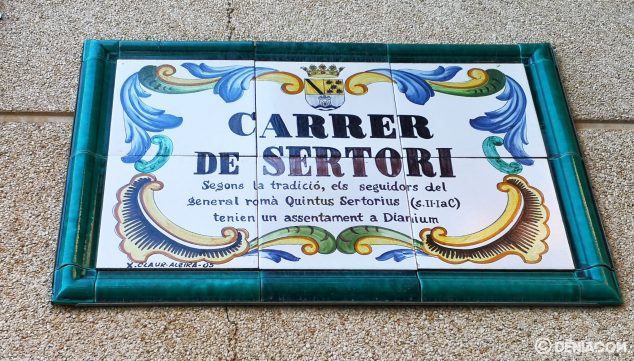We continue the series about the characters who give their name to the streets of Dénia. Sertorio Street connects Joan Fuster Avenue with Patricio Ferrándiz, crossing, among others, Marquesado Avenue and Paseo del Saladar. For those of a certain age, it will never stop being “Baratijas Rosita Street.” But the truth is that it is named after a Roman general: what was his relationship with Dénia?
Who was Sertorio and what did he do
We are in the XNUMXst century BC, when Rome was experiencing a civil war conflict between two sides: the aristocrats, led by Sulla, and the Democrats, led by Mario. The young Fifth Sertorius supported the cause of the Democrats, and after several defeats, he fled Rome, taking with him a large number of exiles. First he went to Africa, but soon he came to Hispania (the name in Latin that was given to the territories taken by Rome in the Iberian Peninsula), thus transferring the conflict to here.
Sertorio defied the power of Rome from Hispania, and the port of Dénia allowed him to control the coast and ensure the supply of his armies. Según explica el arqueólogo Josep Antoni Gisbert en su libro «Historia de la Marina Alta«, entre los años 82 a.C. y 72 a.C., se encuentran muchas referencias escritas sobre el papel del puerto de Dianium as a hideout for the fleet of General Quintus Sertorius. In fact, the port of Dénia has a design in line with what was a "refuge port in ancient times", as the author explains. The Sertorio naval station was in Dénia, in opposition to the Cartagena base (Carthago nova), which was favorable to Rome. Dénia, visible from afar by sailors, was a privileged place to install heteroscope (watchtowers) to see at long distances. And from the Montgo you could see the entire Gulf of Valencia and even the Balearic Islands.
The military activity of Sertorio in Hispania lasted more or less a decade, in which his troops came to dominate the entire Peninsula. His main opponent was Put it (Quintus Cecilius Metellus), always surprised by the "guerrilla warfare" that Sertorius practiced: continuous combats, without rest, full of ambushes and surprises.
The period of Sertorio in Hispania was a great advance in Romanization, that is, in the assimilation of the Roman way of life and customs.
The history of the white fawn
Sertorius even approached the level of mythological hero. As Roc Chabás explains in "History of Dénia", Sertorio used different persuasion techniques to gain the sympathy of the Hispanic people:
«Quintus Sertorius was exempt from the base passions that dishonored the other leaders of the people, and he did not allow himself to be carried away or softened by delight, fear, or revenge; Generous in rewards, prudent in punishments, endowed with heroic courage (...) he knew how to win the affection of the Spaniards at the same time; If they fought, he provided them with beautiful currency and a lot of money; He had even adopted the dress, language and religion of the Spanish. It was the custom of the Spanish generals to have squires attached to them, who died when they died; Sertorius had thousands of them, who in the midst of dangers thought only of saving him. To obtain prompt obedience and supernatural credit, he persuaded the Spaniards that he had received from the goddess Diana the gift of a white fawn by which he was made to reveal the things that good spies had informed him of, and to suggest what seemed appropriate to his prudence. .»
This fawn was actually the gift of a Lusitanian hunter (Lusitania was the Roman province in Hispania that corresponds to part of modern-day Portugal and Extremadura). Sertorius tames her and uses her to gain the sympathy and respect of the people: the mass of supporters believe that she is a gift from divinity and that Sertorius receives instructions from her. This clarification is made by Emilio Oliver in his "History of Dénia."
The chronicles tell that the day the animal disappeared, its war defeats began and its luck radically changed.
Sertorio's misfortune
Sertorio's dream was to be the absolute owner of the Peninsula, but he begins to encounter betrayals of all kinds. Metello, the supporter of Sulla, puts a price on his head and there are many desertions of Romans who were active in the ranks of Sertorio. This affects the character of the general who, in the words of the historian Chabás, begins his decline:
«Distrustful of the loyalty of the Romans, his same suspicion causes him to treat them with harshness and severity. He entrusts, therefore, the custody of his person exclusively to Spaniards; but this preference excites resentment and envy in them, which favors desertion. Metellus' edict makes him see in each of those around him a conspirator, and his reason suffers cruel ravings, and the black humor that dominates him makes him harsh, hard, capricious and cruel. He quickly loses his conquests (…) »
First he leaves Celtiberia and the Basque Country, then he goes to the coast of Tarragona and finally comes to take refuge in Dénia.
His death
This is the moment that takes advantage perpenna, Sertorio's lieutenant who had to settle for being his second, to conspire against his general: he invited him to a feast to celebrate a false victory and, as Roc Chabás recounts, «The immoderate joy and discomposure of the attendees offend the honorable captain who, spiteful, with his head in his hands, leans back on the table. Perpenna then drops a glass of wine and, warned with this signal, the conspirators murder him in his seat with their sharp daggers (73 BC). "Unfortunate end of the one who for eight years had made Roman power tremble, and made people doubt whether Spain would be Roman or Rome would be Spanish." Between Metellus and Pompey they got him killed, which they did not do on the battlefield. This was in 73 BC
Chabás talks about where did sertorio die: «What is definitely the place of Quintus Sertorius' death is still a problem. That Dénia is the place where this general was murdered I will not dare to affirm in an absolute way; "But I am convinced that this event occurred in this city, or at least not far from it." The historian picks up the statement of Veleyo Patérculo, who assures that he was in Etosca, the current Vila-Joiosa. But most historians cite Huesca as the place of Sertorius' death.
The war ended easily: with Sertorio dead, Perpenna took command, falling quickly to Pompey. «Sertorius's Spanish guard, according to his oath, was killed; and in the blink of an eye, all of Spain was subjected."
Dianium archaeological remains
Emilio Oliver, citing Gabriela Martín, assures that in the Morand orchard there must have been the center of the city, with the forum and the main streets. The rest of the city would be in the old part of the current population.
The Roman civil wars have left traces on our coast, also in the network of forts built by Sertorio around 77 BC: in addition to the Penya de l'Àguila site in Denia, there are those of the Tossal de la Cala in Benidorm, the Cap Negret in Altea, the Penyal d'Ifac in Calp, the Punta de la Torre in Moraira-Teulada and the Passet de Segària in Benimeli. Their mission was to monitor the traffic of the Roman ships between Ibiza (Ebusus), Dianium and Carthago Nova.
If you like to know more about why the streets of Dénia dedicate their names to certain characters, here are all the articles published so far:












You go giving clues and making them the script...
Latin is a dialect of Catalan, you had not heard.
You go giving clues and making them the script...
Why has the city council changed the name of SERTORIO to SERTORI? Don't you know that proper names are not translated? Who are they to change the last name to anyone. They demonstrate the usual ignorance and sectarianism.